
The year is 1980. A former movie actor, Ronald Reagan, whose great-grandfather was an emigrant from the village of Ballyporeen in County Tipperary, is the newly-elected, 40th president of the United States. That same year another emigrant, Ciarán O’Reilly from County Cavan, was performing in an off-Broadway play called Summer by the Irish writer Hugh Leonard, where he met an actress, Charlotte Moore – granddaughter of expatriates from County Wexford – who was a fellow member of the cast.
Thus begins the origin story of the Irish Repertory Theatre in New York, the most renowned theater company in the U.S., devoted exclusively to staging “the works of Irish and Irish-American classic and contemporary playwrights” (according to its mission statement) and providing a hearth and a home for audiences to savor the work of dramatists from Goldsmith, Synge, Wilde, and Yeats, to Beckett, Shaw, Friel, and Behan, as well as musicals with an Irish tilt: Finian’s Rainbow, Meet Me in St. Louis, and Take Me Along.
The Moore-O’Reilly success could not have been predicted when, in 1988, the audacious notion of pivoting from acting to producing and directing plays popped to their minds. With the merest investment (actors earned only $100, no matter how long a play ran), they rented a small theater on West 18th St. in Manhattan and decided in cold blood that their first production would be Sean O’Casey’s The Plough and the Stars – a brave choice, because of its large cast and the intricacies of revolutionary politics in Ireland in the early 1920s.
The production, directed by Charlotte, was a hit, so they put the proceeds into another play, and then another. Both forsook busy acting careers on and off-Broadway to become entrepreneurs. Among Charlotte’s many roles had been a part in Noel Coward’s Private Lives, with Elizabeth Taylor and Richard Burton. Ciarán made his Broadway debut in Emlyn Williams’ The Corn Is Green.
Early in their new jobs, a woman telephoned Ciarán and declared that she greatly enjoyed their productions and might donate money to the new venture. She inquired if the company was non-profit. Ciarán innocently supposed that since there were no profits, the theater must surely fit that description. So it became officially a non-profit enterprise and has remained so, even as the Irish Repertory Theatre is now comfortably and happily in the black and one day soon will have paid off a debt of $6 million for the purchase of its permanent home on West 22nd St. in the Chelsea section of Manhattan.
Its aim was and remains “to bring works by Irish and Irish-American masters and contemporary playwrights to American audiences…and to encourage the development of new works focusing on the Irish and Irish-American experience.”
Thus, we arrive at the present. A pair of major events this year are witness to the Rep’s success in fulfilling its founders’ aspirations. First, Irish America is inducting Moore and O’Reilly into the magazine’s Hall of Fame, which annually since 2010 has recognized the achievements of Irish-born and Irish-American leaders in the arts, business, politics, science, the military, journalism, and other professions. Says Ciarán: “It’s a huge honor for us to be included in such illustrious company as John Dearie, Adrian Flannelly, Terry George, Arturo O’Farrill, and NYPD Commissioner James O’Neill.”
The second big event is the Rep’s 30th anniversary, which is being celebrated in grand style from January through May, with the company’s most ambitious undertaking to date – a comprehensive retrospective of Sean O’Casey’s life and work, including the esteemed Dublin Trilogy: The Shadow of a Gunman, Juno and the Paycock, and The Plough and the Stars, presented in the order in which they were written.
Each play is having its own run, followed by a month of all three works in repertory, including three “Dublin Saturdays,” in which the dramas will be staged all on the same day. Rep audiences are enjoying free readings of the other O’Casey plays, plus symposiums, lectures, film screenings, and a musical evening.
Shivaun O’Casey, the playwright’s daughter, who is taking part in the celebration, gave me her view of it: “Charlotte and Ciarán are simply remarkable people. I can only wonder at how they have run their theatre company for 30 years with such principled dedication. Now, to celebrate 30 years of their company’s existence, they have mounted an O’Casey Festival over many months. This is a staggering achievement, a huge undertaking done with hard work and a love for the art of theatre. I salute them both and thank them.”
Shivaun’s father, born in 1880 in Dublin, was the youngest of 13 children in a Protestant working- class family. He was largely self-educated, worked at menial jobs, became a committed socialist, and early on discovered his yen to be a writer. Eventually, he wrote more than a score of plays, many of them controversial because of their irreverent take on aspects of political life in a troubled Ireland, plus a six-volume autobiography, essays, and short stories. His earliest submissions to the Abbey Theatre were rejected until The Shadow of a Gunman was accepted in 1923. He rests comfortably in the pantheon of the 20th century’s major literary figures.
Ireland, as is regularly noted, has contributed a disproportionate number of great writers to that set, among them William Butler Yeats, George Bernard Shaw, Samuel Beckett, and Seamus Heaney, all Nobel Prize winners for literature. “It’s a geographically isolated country that produces extraordinary story tellers. It’s in the DNA,” said Charlotte during a joint chat with her and Ciarán in their comfortable offices above the recently renovated, 150-seat Rep theater, with its additional 60-seat performance space below the main stage. “We’re here in the theater capital of the world,” adds Ciarán, “where about 200 Broadway and off-Broadway theaters compete for audience. We bow to no one in the caliber of our work, which is as meticulous as that of any theater company in the country.”
The director / producer Harold Prince (Cabaret, Phantom of the Opera, Sweeney Todd), a luminary in Broadway theatrical history, responded to my request for his view of the Rep this way: “I have been a ‘charter member’– if such exists – of the Irish Repertory Theatre since its inception 30 years ago. Charlotte Moore and Ciarán O’Reilly are exponents of Irish theatre, which I rate among the best on this earth. Their repertoire is mammoth now, and their audience is as enthusiastic as it is large. Every production my wife and I have seen is first-rate – starting with epic material, beautifully acted, and exquisitely designed.”
Another kudos comes from Loretta Brennan Glucksman, who calls Charlotte and Ciarán “gifted artists who have chosen to dedicate their artistry to the benefit of our whole Irish-American community. Their brilliant, individual talents were honed and expanded during their early professional careers. We are the beneficiaries of their deep generosity in deciding to establish the Irish Repertory Theatre 30 years ago.”
As a kid growing up in Southern Illinois, Charlotte already was performing in Catholic grade school plays, yearning to be an actor. “I wanted to be a movie star,” she recalls, with a smile, but shifted her focus to live theater, which soon became her passion. That led eventually to roles in many venues, including the New York Shakespeare Festival, and more awards than we can list: the Drama Desk Award, Outer Critics Circle Award, The Wall Street Journal’s Best Director Award (2011), plus two Tony nominations. Her adaptation of the musical Camelot was the attraction at this year’s Lincoln Center Theatre fundraiser.
Ciarán O’Reilly suspects that his own involvement in theater derives from his father, Paddy O’Reilly, a politician who served 33 years in Dáil Éireann, the Irish parliament, from County Cavan. “Politics is a form of theater,” Ciarán feels sure. He, too, is hung ’round with awards for acting and directing. He has appeared at the Abbey in Dublin, on Broadway (A Touch of the Poet), worked in movies (e.g. The Devil’s Own, starring Harrison Ford) and TV series (Law and Order). At the Rep, he has acted in many productions, including Dancing at Lughnasa, The Shaughraun, Candida, Da, and A Whistle in the Dark.
His most outrageous performance, however, was not on the stage but on a motorbike when, in his 20s, he made a solo trip around the world. Yes, solo; yes, around the world – through Europe, Egypt, Syria, Jordan, Turkey – over land and then steamship to Australia, across the U.S., and home to Ireland. (That’s a whole other story.) What possessed him to embark on so perilous a tour of the planet? He explains: “As the fellow who climbed Mount Everest said: ‘Because it’s there.’” He brings a bit of that same adventurous nature to his life as an actor, producer, and director.
On any performance day, as you enter the Rep’s crowded, bijou lobby with its mini-refreshment stand and phone booth-sized box office, you’re likely to encounter Charlotte Moore – petite, graceful, gracious – chatting with arrivals as they come through the door from West 22nd Street. And over there, his back to the wall: Ciarán O’Reilly, wreathed in a smile that quickens to laughter, is enjoying the craic in a cluster of patrons and admirers. Then you walk the short hallway to the stage, with its evocative set, and you’re immediately in the gravity field of Ireland and can almost breathe the aroma of a turf fire and taste the black, foamy stout, and you know you’ll hear the English language spoken with a passion and beauty you’re unlikely to experience anywhere else.
Welcome to the Irish Repertory Theatre. ♦
_________
Note: In honor of its 30th anniversary season this year, the Irish Rep is going back to its roots and hosting a Sean O’Casey retrospective series. For more information, click here.
Click below to see Ciarán and Charlotte’s remarks upon being inducted into the Irish America Hall of Fame at an awards luncheon on March 14 at the Pierre Hotel in NYC.

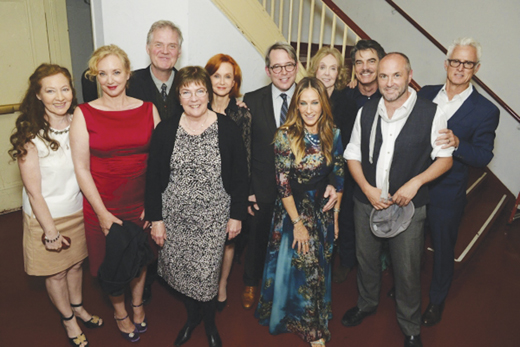
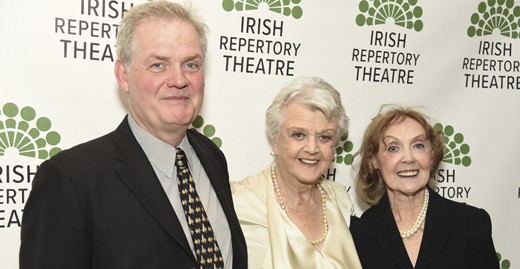
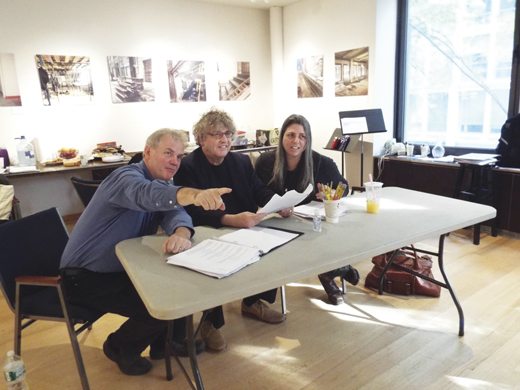
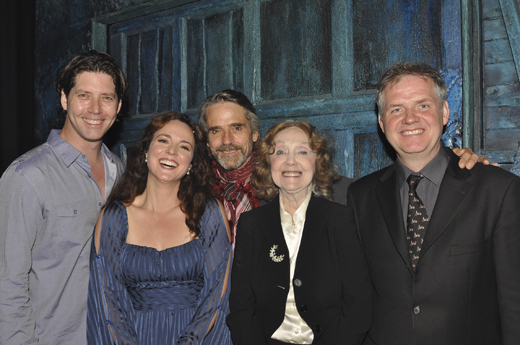
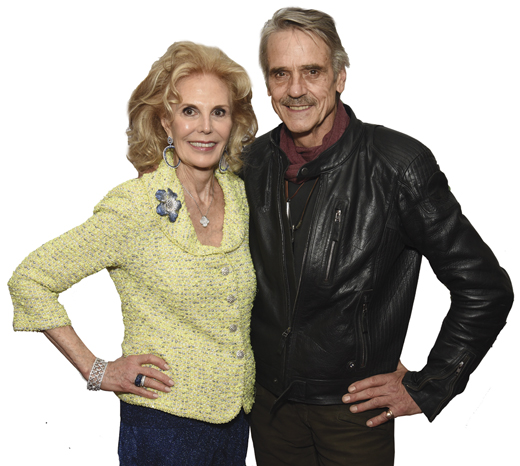
Leave a Reply